Daily Vocabulary Words: Enhance Your Lexicon with Leading Newspapers & Publications
Welcome to the Daily Vocabulary section at Wordpandit!
Our mission is straightforward: to bring you essential vocabulary words featured in top newspapers and publications worldwide. By focusing on words you’ll encounter in renowned sources, we aim to help you enhance your vocabulary effectively and practically.
Our selection includes words from:
– The New York Times
– The Washington Post
– Scientific American
– BBC
– The Guardian
– Psychology Today
– Wall Street Journal
– The Economist
– The Hindu
– The Times of India
– The Economic Times
– Hindustan Times
– Live Mint
– The Indian Express
– And many more.
We are committed to your vocabulary development. Simply visit this section regularly and explore the daily posts. This is your go-to repository for commonly used words, providing significant practical benefits by familiarizing you with vocabulary from the leading publications listed above.
Make it a habit to visit our website daily and expand your lexicon with words from top newspapers and publications. (edited)
WORD-1: PARADOX
CONTEXT: The Indian state is a paradox of too big and yet too small. Try setting up a business or building a house in an urban area, and you will quickly realise how the thicket of the licences, permits, clearances, and permissions can make life impossible. Even as an ordinary citizen, one can never be sure to be on the right side of the law and the circuitous regulations.
SOURCE: The Hindu
EXPLANATORY PARAGRAPH: A paradox is like a little puzzle that doesn’t seem to make sense at first. Imagine if someone said, “This sentence is a lie.” If the sentence is true, then it’s lying, but if it’s lying, it must be true! It’s something that seems impossible or contradictory, but makes you think really hard.
MEANING: A statement or situation that seems impossible or self-contradictory, but might actually be true (noun).
PRONUNCIATION: PAIR-uh-doks
SYNONYMS: Contradiction, puzzle, mystery, enigma, irony, conundrum
USAGE EXAMPLES:
1. The paradox of time travel often confuses people who think about it too much.
2. It’s a paradox that the more we learn, the more we realize how little we know.
3. The situation was a paradox: to make money, you first had to spend it.
4. The story presents a paradox where the hero is also the villain.
WORD-2: CIRCUITOUS
CONTEXT: The Indian state is a paradox of too big and yet too small. Try setting up a business or building a house in an urban area, and you will quickly realise how the thicket of the licences, permits, clearances, and permissions can make life impossible. Even as an ordinary citizen, one can never be sure to be on the right side of the law and the circuitous regulations.
SOURCE: The Hindu
EXPLANATORY PARAGRAPH: Imagine if you were trying to get to the park, but instead of going straight there, you took a very long, twisty road that went all around town first. That’s what “circuitous” means—it’s when something takes a long, winding path instead of a direct one.
MEANING: Taking a roundabout or indirect route (adjective).
PRONUNCIATION: sir-KYOO-ih-tus
SYNONYMS: Roundabout, indirect, winding, meandering, serpentine, convoluted
USAGE EXAMPLES:
1. The hikers took a circuitous route to the mountain summit.
2. His explanation was so circuitous that I couldn’t follow his main point.
3. They drove a circuitous path through the countryside, enjoying the scenery.
4. The story was told in a circuitous way, making it hard to understand at first.
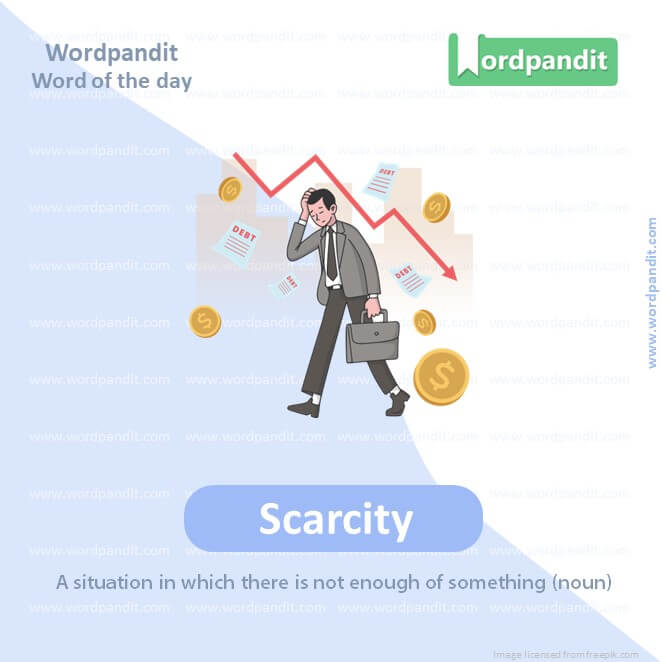
WORD-3: SCARCITY
CONTEXT: The Indian state is relatively small on the other metrics, such as the tax-GDP ratio and public expenditure-GDP ratio. Be it public goods provisions, welfare payments, or the justice system, it is a story of scarcity rather than surplus.
SOURCE: The Hindu
EXPLANATORY PARAGRAPH: Scarcity is when there isn’t enough of something. Imagine you only have one cookie, but three friends who all want a piece. Because there’s not enough to go around, that’s what we call scarcity—there’s less of something than people need or want.
MEANING: A situation in which there is not enough of something (noun)
PRONUNCIATION: SKAIR-si-tee
SYNONYMS: Shortage, lack, insufficiency, deficiency, dearth, rarity
USAGE EXAMPLES:
1. During the drought, there was a scarcity of water in the town.
2. The scarcity of food led to higher prices in the market.
3. There is a scarcity of skilled workers in this industry.
4. The scarcity of resources caused tension among the villagers.
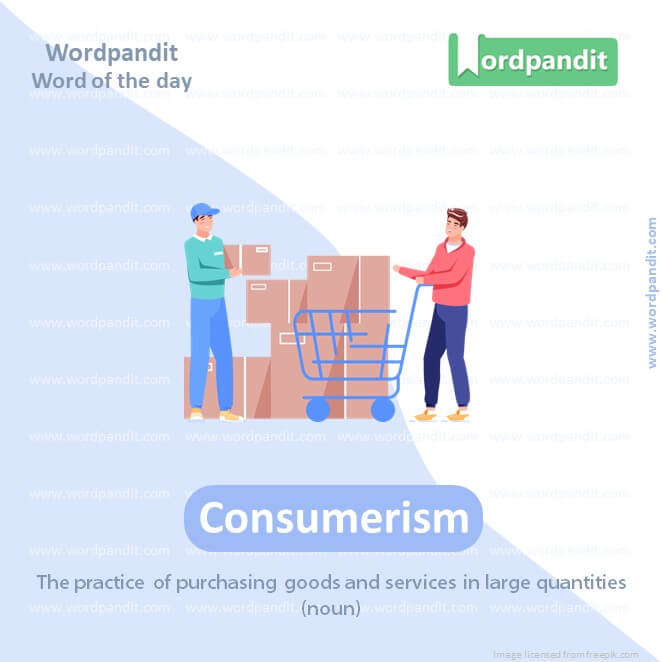
WORD-4: CONSUMERISM
CONTEXT: Pollution is not just a burning issue, but it is a lifestyle result. Man has adopted dangerous proportions of needs, wants and consumerism. Now it may sound out of place to say that the consumption habit is at the root of not only pollution but also major ills we are as a global population facing today.
SOURCE: The Hindu
EXPLANATORY PARAGRAPH: Consumerism is when people buy and use a lot of things. It’s like going to a toy store and wanting to get every single toy on the shelves, even if you don’t need them. It’s about wanting and buying lots of stuff because you think it will make you happy.
MEANING: The practice of purchasing goods and services in large quantities (noun)
PRONUNCIATION: kun-SOO-mer-izm
SYNONYMS: Materialism, buying culture, consumption, commercialism, acquisitiveness
USAGE EXAMPLES:
1. The rise of consumerism has led to more people buying things they don’t need.
2. Some people criticize consumerism for making people focus too much on material goods.
3. The advertisement encouraged consumerism by suggesting everyone needed the latest gadget.
4. He rejected consumerism and chose a simpler lifestyle.
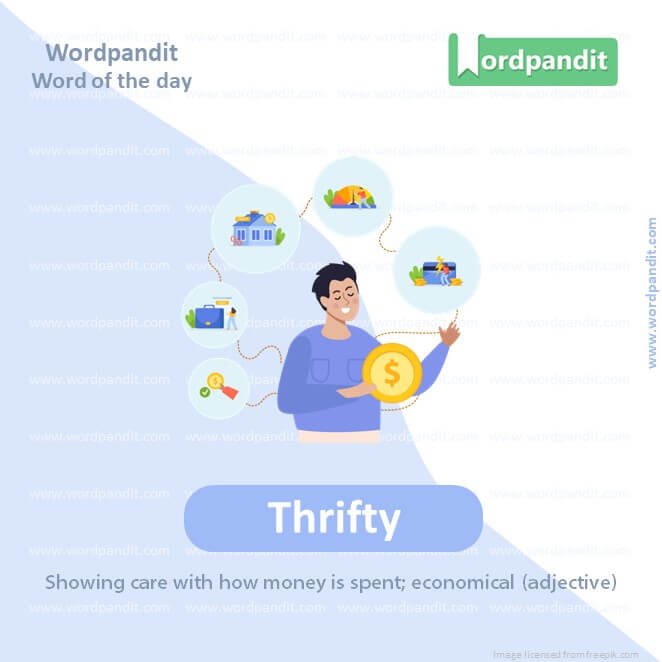
WORD-5: THRIFTY
CONTEXT: Man was thrifty even a few decades ago, leading a much simpler and economical life. Strangely, improvement in certain economic indices led to an increase in pollution. The lifestyle preferences, food habits and increased demands by employers can be rightly held responsible for the evils today.
SOURCE: The Hindu
EXPLANATORY PARAGRAPH: Thrifty is when you’re really good at saving money and not wasting anything. Imagine you have a piggy bank and you carefully put your allowance in it every week, instead of spending it all on candy right away. That means you’re being thrifty!
MEANING: Showing care with how money is spent; economical (adjective)
PRONUNCIATION: THRIHF-tee
SYNONYMS: Economical, frugal, prudent, saving, penny-wise, stingy
USAGE EXAMPLES:
1. She is thrifty and always looks for the best deals before buying anything.
2. Being thrifty, he managed to save enough money to buy a new bike.
3. They live a thrifty lifestyle, avoiding unnecessary expenses.
4. The thrifty shopper found a way to buy groceries without spending too much.
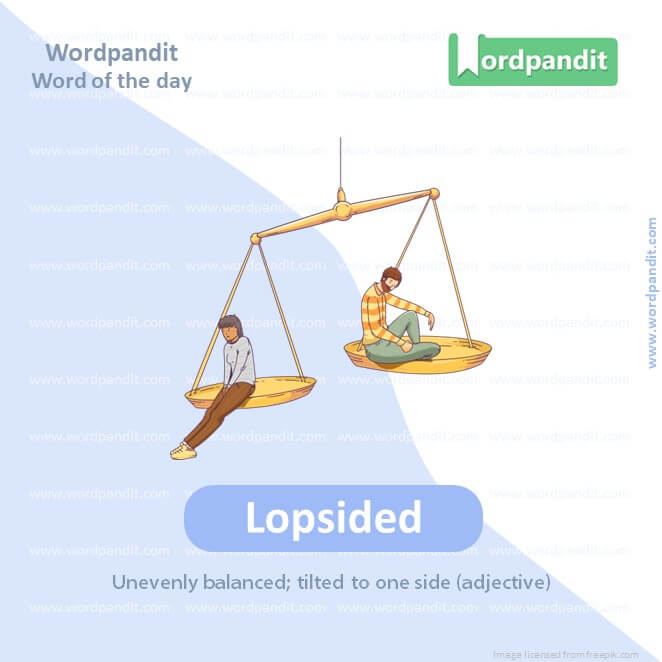
WORD-6: LOPSIDED
CONTEXT: Densely populated crowds everywhere, with large buildings, very little greenery, and lives are being lived in most dangerous places. Survival and existence are a true challenge. The population spread is too lopsided and far from being even. We have made our lives miserable.
SOURCE: The Hindu
EXPLANATORY PARAGRAPH: Lopsided is when something isn’t even or balanced. Imagine if you built a tower of blocks, but one side had more blocks than the other, so it leaned over to one side. That’s lopsided—when one side is different or heavier than the other.
MEANING: Unevenly balanced; tilted to one side (adjective)
PRONUNCIATION: LOP-sy-did
SYNONYMS: Uneven, unbalanced, tilted, askew, off-center, asymmetrical
USAGE EXAMPLES:
1. The picture frame was lopsided on the wall, hanging lower on one side.
2. Their friendship seemed lopsided, with one person doing all the giving.
3. The competition was lopsided, with one team dominating the game.
4. He wore a lopsided grin after hearing the funny joke.
WORD-7: MISERABLE
CONTEXT: Densely populated crowds everywhere, with large buildings, very little greenery, and lives are being lived in most dangerous places. Survival and existence are a true challenge. The population spread is too lopsided and far from being even. We have made our lives miserable.
SOURCE: The Hindu
EXPLANATORY PARAGRAPH: Miserable is how you feel when you’re very, very sad or uncomfortable. Imagine it’s raining, and you’re cold, wet, and tired—that feeling is miserable. It’s when things are just really bad and you feel unhappy.
MEANING: Very unhappy or uncomfortable (adjective).
PRONUNCIATION: MIZ-er-uh-bul
SYNONYMS: Unhappy, sad, wretched, gloomy, depressed, despondent
USAGE EXAMPLES:
1. The cold weather made him feel absolutely miserable.
2. She was miserable after her best friend moved away.
3. The dog looked miserable after being out in the rain.
4. His miserable expression showed that he wasn’t enjoying the party.
WORD-8: SAPLINGS
CONTEXT: Trees are felled mercilessly, the need for wood and widening spaces are given priority over fresh breath of air. Planting saplings after felling of huge trees is a cruel joke, the intervening period between felling of trees and the time for plants to grow into huge trees can be described as seriously dangerous times.
SOURCE: The Hindu
EXPLANATORY PARAGRAPH: Saplings are like baby trees. Imagine planting a tiny seed in the ground, and after some time, a small tree begins to grow. This little tree is called a sapling—it’s young and just starting to grow big and strong.
MEANING: Young trees, especially those that have just started growing (noun).
PRONUNCIATION: SAP-lings
SYNONYMS: Young trees, seedlings, shoots, sprouts, juveniles, sapwood
USAGE EXAMPLES:
1. They planted saplings in the garden to create a small forest.
2. The storm damaged many of the saplings that were recently planted.
3. As saplings, the trees need a lot of care to grow strong.
4. The forest was full of new saplings growing under the taller trees.
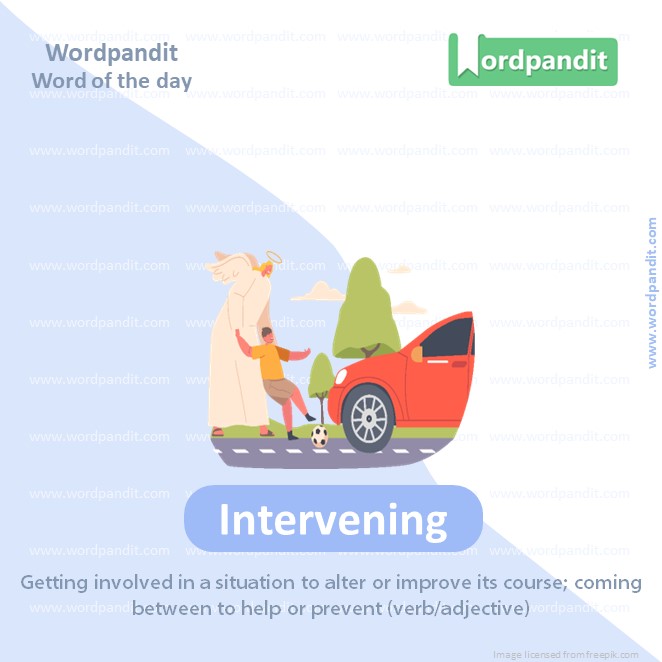
WORD-9: INTERVENING
CONTEXT: Trees are felled mercilessly, the need for wood and widening spaces are given priority over fresh breath of air. Planting saplings after felling of huge trees is a cruel joke, the intervening period between felling of trees and the time for plants to grow into huge trees can be described as seriously dangerous times.
SOURCE: The Hindu
EXPLANATORY PARAGRAPH: Intervening is like stepping in to help when something isn’t going right. Imagine two friends are arguing, and you step in to stop them from fighting. That’s intervening—you’re getting involved to change what’s happening.
MEANING: Getting involved in a situation to alter or improve its course; coming between to help or prevent (verb/adjective)
PRONUNCIATION: in-ter-VEE-ning
SYNONYMS: Interceding, mediating, stepping in, interfering, intruding, interrupting
USAGE EXAMPLES:
1. The teacher intervened when the students began arguing loudly.
2. She had to intervene to prevent the situation from getting worse.
3. The government intervened to stabilize the economy during the crisis.
4. He was grateful for his friend intervening when the bullies approached.
WORD-10: DETRACTORS
CONTEXT: The proponents of inclusive development rightly pitch for a bigger role for the state — increased public spending on health, education, social security and a larger officialdom to go with it. Their detractors, on the other hand, cite innumerable policy failures to argue for a smaller state.
SOURCE: The Hindu
EXPLANATORY PARAGRAPH: Detractors are people who say bad things about someone or something, even if it’s not true. Imagine someone always saying your drawing is bad, even if it’s not—that person is a detractor, someone who tries to make things look worse than they are.
MEANING: People who criticize or speak ill of something or someone, often unfairly (noun).
PRONUNCIATION: di-TRAK-ters
SYNONYMS: Critics, naysayers, opponents, adversaries, faultfinders, attackers
USAGE EXAMPLES:
1. Despite his success, he still has many detractors who criticize his work.
2. The company faced several detractors who doubted its new product.
3. Detractors tried to discredit her, but she remained confident in her abilities.
4. Even with detractors, the artist’s popularity continued to grow.
Vocabulary new Words
In the exuberant realm of language learning, nothing holds more thrill than the discovery of ‘vocabulary new words’. These gems of knowledge bring with them a fresh perspective and a deeper understanding of language. However, learning ‘vocabulary new words’ requires a methodical and focused approach.
The act of learning ‘vocabulary new words’ is a delve into linguistic novelty, often involving exposure to unfamiliar structures and meanings. Transcending the traditional approach of mere memorization helps in truly cementing newly learnt words into long-term memory. Interaction with a broad spectrum of written and spoken material, including novels, films, podcasts, and digital resources, provides a rich context of ‘vocabulary new words’ and significantly aids in their comprehension.
It’s noteworthy that unpacking ‘vocabulary new words’ is a steady process rather than a rushed one. A planned approach with a specific number of words, learned and reviewed each day, proves beneficial in effective learning. Coupling this method with technologies such as flashcards or memory-enhancement software can optimize the retention of ‘vocabulary new words’.
Integrating mnemonic devices and visual imagery is another highly efficient tool when learning ‘vocabulary new words’. Assigning unique stories or visuals to new words can enhance recall, making unfamiliar vocabulary much more approachable.
Lastly, practicing ‘vocabulary new words’ within daily routine is crucial for grasping their usage. Whether it’s through active utilization in conversation or incorporating these words in written communicative situations, application reinforces understanding.
In summation, mastering ‘vocabulary new words’ is an enriching pursuit that expands our linguistic horizons. However, a balanced approach, combining diverse reading materials, pacing your learning, employing memory-boosting strategies, and daily practice greatly streamlines the task. Embark on this fascinating journey, and let the ‘vocabulary new words’ fill your linguistic canvas with a fresh palette of expressions.










